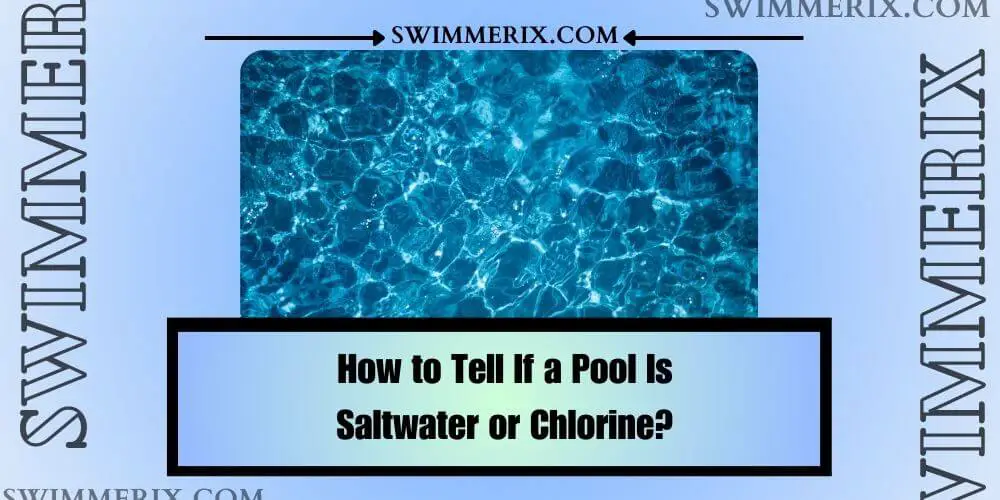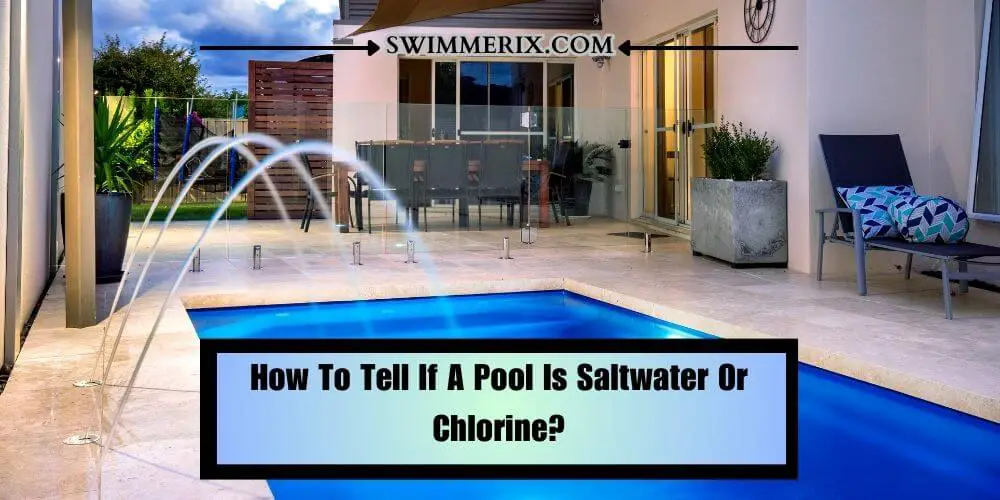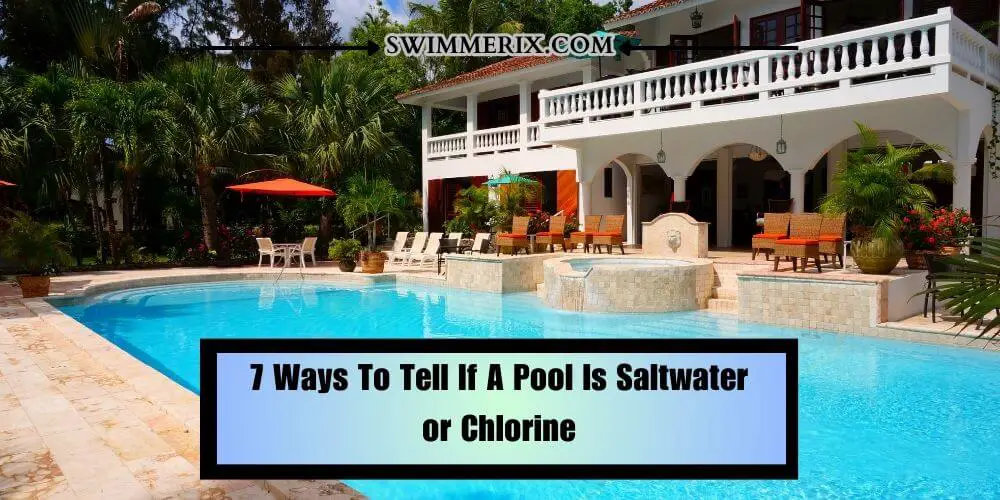
Looking for solutions on how to tell if a pool is saltwater or chlorine? This is the article for you. When you visit a new place and spot a pool, you often wonder if it’s treated with salt water or chlorine. If this is the case, read this article thoroughly. The type of pool can affect your swimming experience & health. Also, it severely affects the maintenance requirements of the pool itself.
Therefore, in this article, I am not only going to help you learn ‘how to tell if a pool is saltwater or chlorine,’ but we will also be discussing physical observation, chemical testing, maintenance, equipment, pool water characteristics, as well as health & environmental aspects.
Later, we will also focus on the conversion consideration, maintenance requirement, safety consideration & more. But before I tell you all of these, let’s first begin with knowing ‘how to tell if a pool is saltwater or chlorine.’
How To Tell If A Pool Is Saltwater Or Chlorine?

You can taste the water, and if it is slightly salty, the water pool water has been treated with salt content. On the other hand, chlorine pools will have a neutral taste. In addition, saltwater pools often look like crystal clear Water like Ocean, whereas chlorine pools can appear slightly cloudy or green tint due to algae growth or improper chemical balance. You can also perform chemical tests to determine the type of pool.
7 Ways To Tell If A Pool Is Saltwater or Chlorine

Taste
To start, consider making some initial observations to determine the type of pool you are in. One of the effective methods that people find is to taste the water itself. Yes, the pool water will give your typical salty taste due to its salt content used in the treatment.
On the other hand, if you are in a chlorine pool, you will find its water has a neutral taste. However, ensure you are not ingesting a large amount of pool water, as it can be hazardous for your health & well-being regardless of the type.
Clarity & Color
Another way to tell if a pool is chlorine or saltwater is by considering the water clarity & its color. You may know this, but saltwater pools are known for their crystal clear water resembling the oceans.
On the other hand, you will find the chemical pool sometimes appears slightly cloudy. Sometimes it also has a slight green tint due to its algae growth or improper chemical balance. Ensure you’re paying attention to the regular maintenance & monitoring to keep both types of pool clear and inviting.
Smell
Another thing that can provide you valuable inside into the identification of saltwater pools or chlorine pools is the presence of smell. A chlorine pool is known to release a strong chlorine smell.
However, you should also note that a well-maintained chlorine pool will also have no such overpowering smell. On the other hand, saltwater pools tend to carry a faint scent, similar to the ocean breeze.
Also Read: Why Does My Pool Smell Like Fish
pH & Salinity Testing
Another method is to perform a chemical test. Consider testing the pH level of the pool to determine its type. If the pool is saltwater, the pH level would be around 7.2 and 7.8. On the other hand, chlorine pool water will give you a slightly lower pH level of around 7.0 to 7.4.
However, get a reliable pool testing kit readily available at a local pool supplies Store to measure the pH accurately. In addition to pH testing, you can also consider measuring the salinity of the pool water.
As per Swim University, saltwater pools usually contain salt levels of around 2700 to 3500 parts per million (ppm), similar to the salinity of ocean water. You can take the help of testing stripes that are specifically designed for salinity measurement to help determine whether a pool you are in is saltwater or chlorine-based.
Also Read: Why is my Pool Cloudy After Ph Increaser
Chlorine Test
Also, you can directly check the chlorine level, giving you a more detailed insight. If you have ever seen saltwater pools, you might know that a chlorine generator is required to produce chlorine from the salt in the water.
Therefore the chlorine level in saltwater pools will generally be lower than in traditional chlorine poles. In saltwater pools, you will likely find a chlorine level of 1-3 parts per million (ppm), whereas chlorine pools may have higher levels, usually between 3-5 PPM.
Here, consider taking the help of pool testing stripes or kits to further assist in determining the chlorine levels accurately.
Related Topic: Why Pool Won’t Hold Chlorine
Maintenance & Equipment
After understanding all of this, let’s focus on the maintenance equipment used in the pool to clarify that type further. Chlorine pools use chlorine tablets or liquid chlorine manually added to the water to maintain proper disinfection.
On the other hand, saltwater pools use salt cells or generators that convert salt into chlorine through an electrolytic process. This eliminates the need to add chlorine while manually offering a continuous self-regulating system.
This system may be ironic or robust to some; it also requires effort, budget, and maintenance to keep working. You should also know that regularly shocking the pool is the most common maintenance task in both pools.
During shocking, you need to add a high dose of chlorine to the pool that kills any bacteria or algae present. If you’ve 15k gallon pool, read: How Much Liquid Chlorine Do You Need for Your 15000 Gallon Pool
However, determine the right frequency of shock that may differ between saltwater & chlorine pools. It’s best to stick with the manufacturer’s guidelines & instructions or consult with a pool professional for appropriate shocking practices.
Pool Water Characteristics
The last thing you must consider is the impact on pool characteristics. Saltwater pools are known for their gentler effect on the skin & eyes. The lower chlorine level present in the saltwater pool generally reduces the likelihood of skin and eye irritation often associated with traditional chlorine pools.
It is also important that you know individual sensitivity may be right. Chlorine pools have a higher risk of corrosion due to a higher chlorine level.
On the other hand, saltwater pools with lower chlorine level concentrations generally pose a lower risk of corrosion to pool equipment, fixtures, and surrounding surfaces. Also, pay attention to regular maintenance & appropriate water chemistry balance that prevents corrosion in any pool type.
To determine the maintenance cost, you must find out the pool type. Maintenance costs also varied depending on the pool type between saltwater & chlorine. Saltwater pools have higher upfront costs due to installing salt generators or cells.
Saltwater pools require less maintenance and fewer chemical purchases in the long run, potentially leading to cost savings. If you compare the initial investment and an ongoing maintenance expense, saltwater pools are a more budget-friendly & suitable option for a long-term oasis.
Health & Environmental Aspects
What type of pool you can have ultimately depends upon your choice & consideration. However, also consider the environmental aspects that can guide your decision between saltwater & chlorine pool.
Saltwater pools offer potential health benefits, like the natural exfoliating effect of saltwater, which can refresh your skin. Also, the lower chlorine level present in saltwater poles reduces the likelihood of respiratory irritation.
It is crucial to note that few individuals with certain health conditions may suffer a reaction & they may consult their Health Care provider before swimming in any pool. If you look at it from an environmental perspective, saltwater pools are also considered eco-friendly compared to chlorine pools.
The chlorine generator in the saltwater pool reduces the need for storing & handling large quantities of chlorine, potentially minimizing the release of harmful chemicals into the environment. However, note that both types of pools need proper maintenance & responsible chemical usage to ensure minimal environmental impact.
Conversion from Chlorine to Saltwater
Now, if you already have a chlorine pool and want to convert it to a saltwater pool, a few factors must be considered. First, converting a pool will involve installing a salt cell or generator while adjusting the pool chemistry.
Therefore, consider the pros & cons of conversion and the estimated cost. Also, consider whether you want to undertake the conversion as a DIY project or hire a professional. Conducting a cost analysis is very important when you are evaluating the conversion.
The expenses you must consider include the cost of a salt cell or generator, additional plumbing, and necessary electrical modification. Also, always consider the ongoing maintenance & salt purchases occasionally. It’s best to research local pool professionals and consult with them to help determine the estimated cost for the conversion.
A poor supplies store can also help you. Ironically, DIY conversion helps save money but may require a good understanding of pool equipment and chemistry. Therefore, hiring a professional will be better to ensure the conversion is done correctly and nothing wrong appears in the future. Hiring professionals may offer additional guidance on maintaining the saltwater pool effectively.
Maintenance Requirements
No matter what type of pool you have, regular maintenance is important to keep it clean _ and safe for the swimming experience. Some essential tank maintenance, including monitoring & adjusting the water chemistry, cleaning the pool surface & equipment, and regular filter maintenance.
Also, regularly test the pool water for PH & chlorine level while ensuring proper circulation & filtration to help maintain water quality. It is also important that you consider the seasonal adjustment in pool maintenance.
Factors like temperature, weather conditions, and pool usage will directly impact the water chemistry & maintenance requirement. Therefore you must adjust the flooring level and provide shock treatment to the pool with proper cleaning routines accordingly, ensuring optimal poor conditions throughout the year for a safe & healthy swimming experience.
If you also want to prolong the life of your pool, proper long-term maintenance practices must be followed. You will have to regularly inspect and maintain the pool equipment while completely addressing any repair or leak if you come across it. You should also ensure your structural integrity and protect it from excessive sunlight & weather exposure to maintain its appearance & functionality.
Safety Considerations
Also, ensure that you are considering pool safety. For electrical safety, you must follow proper solution & maintenance practices for pool equipment. It is important to regularly inspect electrical components using ground fault circuit introductors and keeping electrical cords away from pool water as a safety measure.
Also, make sure to employ proper storage & handling of pool chemicals to prevent accidents. You must store pool chemicals in a cool, dry place, away from direct heat or out of reach from your children and pets.
Also, follow the manufacturer’s instructions for handling, dosing, and storing pool chemicals to avoid any potential hazards. Hazardous consequences may appear if you don’t implement safety measures for pool users.
You must establish clear pool rules and provide supervision for young children. Also, you must ensure that everyone in the pool knows how to swim and follow safety guidelines to prevent accidents and promote a safe swimming environment.
Conclusion
Determining whether a pool is saltwater or chlorine at first glance can be difficult for some people. However, you can easily tell if it is saltwater or chlorine if you know the right method of physical observation & chemical testing.
I have given my best to give your complete understanding of saltwater & chlorine pools, including maintenance requirements, water characteristics, and health & environmental aspects with safety considerations essential for making an informed decision.
Ultimately, the choice between chlorine & saltwater pool depends upon your personal preferences, maintenance capability, & budget consideration. Consider all the aspects and factors mentioned in this article before deciding.
Generally, I love saltwater pools as they provide health benefits while being eco-friendly. Ultimately the decision is yours, but try to make the best one to ensure an enjoyable & refreshing swimming experience.
Next time you will be better equipped with the knowledge to identify the pool type & enjoy your swimming. I have done my best to give you in-depth knowledge on ‘how to tell if a pool is saltwater or chlorine.’
If you find this article helpful, then consider sharing it. Your share will not only help people learn ‘how to tell if a pool is saltwater or chlorine’ but also the difference between these two types & which one is better. Do check my other helpful guide on pool water care & maintenance. See you in the next post, till then, take care & goodbye.

Hi, This is Josh. I am a former competitive swimmer and current fitness enthusiast.
I created this site to share my love of swimming with the world!
